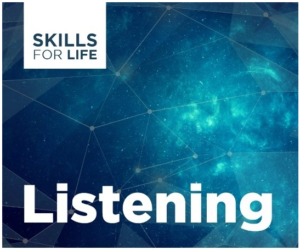Four benefits of developing listening skills and the steps to achieve it
Valentina Gimenez - JungKyu Rhys Lim
Active listening brings enormous benefits. Although it is difficult to achieve listening skills, they can be taught. It is one of the skills that children and adolescents need to prosper in this 21st century.
We live in a world of noise, where social networks and technology-mediated interpersonal communication encourage us to continuously speak, write, and give our opinions. However, although we engage in dialogues, we often hardly listen to each other carefully. Therefore, developing listening skills is crucial.
 According to Kate Murphy, a journalist, New York Times contributor, and author of the book, “You are not listening. What you are missing and why it matters,” “It is only by listening that we engage, understand, connect, empathize, and develop as human beings. It is fundamental to any successful personal, professional, and political relationship.”
According to Kate Murphy, a journalist, New York Times contributor, and author of the book, “You are not listening. What you are missing and why it matters,” “It is only by listening that we engage, understand, connect, empathize, and develop as human beings. It is fundamental to any successful personal, professional, and political relationship.”
Download the publication: Skills for Life: Listening. Here
Four Benefits of Learning to Listen
Listening is not just about hearing what others say but understanding others’ viewpoints, emotions, and needs. Active listening involves paying attention, showing interest, asking questions, and avoiding interrupting or judging. So here are the top benefits of listening, featured in Skills for Life: Listening.
1. Improve communication.
Active listening lets us understand what others think, feel, and want to convey. We can gain a much deeper understanding and avoid misunderstandings and miscommunications by paying attention to their words and gestures. By listening, we can also show interest and respect for others, creating a climate of trust and collaboration. For example, research by Izchakov and Kluger (2018) found that building a listening-based communication culture makes workers feel more relaxed, more self-aware of their strengths and weaknesses, and more willing to reflect non-defensively, which results in an improvement in communication.
2. Increase learning.
Listening helps us learn and assimilate knowledge from different sources. For example, listening skills can improve reading comprehension, learning, and academic performance early and later (Jalongo, 2010). The first three years of life are critical for developing auditory and neural connections in the brain, and early listening experiences are building blocks for literacy. Therefore, listening skills can improve reading comprehension, learning, and academic performance.
3. Strengthen bonds between people.
We maintain our connections with others by listening. Therefore, it is a fundamental skill for any successful relationship. Furthermore, listening allows you to develop other skills, such as empathy, which leads to a better understanding and collaboration between peers. In addition, it shows respect, interest, and trust towards the other.
4. Improve mental health.
Listening has a positive impact on our mental and emotional health. By listening to other people, we can feel accompanied, understood, and supported in difficult times. This helps us reduce stress, anxiety, and depression. Umphrey and Sherblom ’s (2017) empirical research shows that listening “not only connects us and helps us negotiate our relational differences, but listening also facilitates self-reflection and helps us understand and develop our ways of thinking and feeling.”
Do you want to know more about developing active listening skills to advance your personal and professional development? Is it a skill that should be taught in school? Keep on reading here…
WiConnect is the IDB Group’s georeferenced platform that allows knowing who does what, where and how in Latin America and the Caribbean with the purpose of advancing towards the sustainable growth of the countries. If you are not yet part of this community, REGISTER your organization NOW. You will be able to access more premium content, find out about scholarships and financing opportunities, connect with potential allies for your development projects and make your organization visible.
Valentina Gimenez - JungKyu Rhys Lim
Leave a Reply